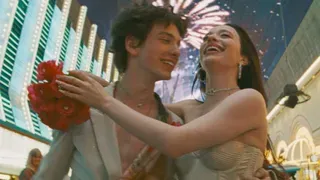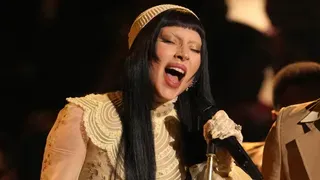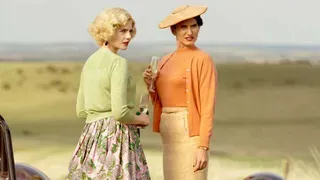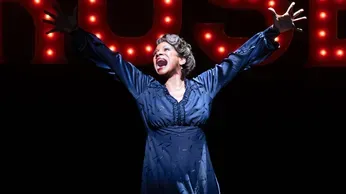
December 23, 2024
Review Round-up: 'Here She Is World': Audra McDonald in 'Gypsy'
Robert Nesti READ TIME: 14 MIN.
What is likely to be the battle for the Best Actress in a Musical Tony Award next Spring will come down between two stars in revisionist versions of two classic musical: Nicole Scherzinger for her Norma Desmond in "Sunset Boulevard" and six-time Tony winner Audra McDonald in the new revival of "Gypsy," which opened on Thursday at the refurbished Majestic Theatre, where she plays Rose, the mother of all stage mothers. From the first preview on, the buzz was considerable. And judging from the reviews, she triumphed as the sixth Rose to open in the role in a Broadway production.
Arthur Laurents adapted his book from the memoirs of stripper Gypsy Rose Lee that followed her early career in vaudeville when she toured the country with her sister in a vaudeville act with Rose pushing them every step of the way. With an electrifying score by composer Jule Styne and lyricist Stephen Sondheim, "Gypsy," with the dynamic Ethel Merman capping her long career as Rose, opened in 1959 to rapturous reviews. Walter Kerr of the "New York Herald Tribune" called it "the best damn musical I've seen in years." And initially the show was a sell-out, but it failed to win any of the eight Tony Awards it was nominated for and closed after a respectable run of 702 performances with Merman touring. (She hoped by doing so she would get to star in the film version, but no dice: Rosalind Russell was cast instead, which devastated Merman.) The Best Musical Tony that season was shared by "The Sound of Music" (which run twice as long as "Gypsy") and "Fiorello! (which had already won the Pulitzer Prize for some inexplicable reason.) For what many consider her best Broadway performance, Merman lost to Mary Martin, to which she quipped: "How are you going to buck a nun?"
Sondheim has said he wasn't surprised that the musical wasn't a major hit at that time. "It was an unpleasant show by the standards of 1950's musicals, where everyone ends up happy,'' he told Frank Rich in 2003. And while steeped in show business nostalgia, "Gypsy" is an unsentimental show that tells hard truths about parenting. Over the years its reputation has grown to where it is considered amongst the greatest musicals ever written with Rose being compared to King Lear of starring roles. It was Angela Lansbury, first in London in 1973 and Broadway the following year, who showed that "Gypsy" was far more than an Ethel Merman vehicle; and in the years since it has been revived with Tyne Daley, Bernadette Peters, and Patti LuPone, with Peters joining Merman in not winning a Tony.
While Jerome Robbins directed the original production, it has been its librettist Laurents who put his personal stamp on the show, directing three of revivals (1974 with Lansbury; 1989 with Daley; and 2008 with Lupone). British director Sam Mendes directed the troubled 2003 production with Peters that was said to have been loathed by Laurents. At the first preview he was said to have stormed up the aisle and cornered Mendes saying, "Well, you've done something I didn't think anyone could – you've ruined 'Gypsy.'" Laurents denied both saying that and to storming up the aisle as reported by then-New York Post theater columnist Michael Riedel, though he later wrote of disdainfully of Mendes. For his part Mendes called Laurents "scary" and was shocked by the "the poisonous hatred that exuded off this tiny homunculus" in a New Yorker profile.
Since then Laurents and Sondheim have passed, which marks this production, directed by George C. Wolfe, the first to be seen outside of its creative team's shadow. And from all reports, Wolfe also moves away from Laurents' model. While minor changes have been made to the script, he subtlety explores the racial subtexts. This is not a 'color-blind' production; instead McDonald is seen as a Black woman fighting for her children's success in the racist world of show business during the last days of vaudeville. Whether he succeeds or not, is questioned by some of the reviewers; as is whether McDonald is vocally correct for the brassy role. But for the most part, the production received raves, if only for its full-bodied presentation, which includes a cast of 30 and a full orchestra of 25-musicians performing the musical's first orchestrations (augmented some to today's standards). No doubt to hear its blazing overture with the full complement of musicians as it was conceived for is a thrill in itself. But at its center of it all is McDonald. Here are a sampling of the reviews:
Jesse Greene, New York Times
Read the review.
"McDonald, as will be no surprise if you've seen her in full dramatic mode, makes a meal of Rose's ambition and, with a slight southern drawl, a dessert of her guile.. . .
"That not all this revival's choices will please everyone is probably a good thing. On occasion, I found myself recalling moments that moved or thrilled me more in earlier productions, just as I did when I saw those productions in the first place. "Gypsy," like other great works of midcentury American drama – it opened the same season as Lorraine Hansberry's "A Raisin in the Sun" – rewards a layering of lifetime impressions. Wolfe offers a rich new layer, sufficient in itself, and more so as part of history.
"Most important, he has given us a way of seeing a star who had to be seen in this role. As "Gypsy" suggests, and McDonald keeps proving, a pioneer woman needs a frontier."
Sara Holdren, Vulture
Read the review.
"Six-time Tony winner Audra McDonald shoulders the big handbag and small dog as she stomps down the aisle at the top of George C. Wolfe's revival to thrilled applause, and she earns it – the production as a whole, less convincingly so. . .
"Despite its indestructible book and score and several strong performances, the show Wolfe has built never quite hangs together. Its gestures at times feel stock, at other times scattered, and as in much of Wolfe's work with Loquasto, there's a sense of getting stuck somewhere between worlds. Is this a scrappy production, or isn't it? Well, of course it isn't, but one gets the sense that somewhere along the line, it might secretly have wanted to be. . .
"If you're a Mermanite when it comes to Roses, McDonald's classically beautiful, honey-golden voice might throw you. There's no honk or bellow about her. She doesn't rail; she resonates. But she also acts the pants off the role. She makes clear why Momma Rose has famously traveled through so many types of voices, drawing fans and defenders with every transformation: because truly, the part is a great acting role. You can sing it beautifully or you can sing it ugly, but any way you try it, you've got to be able to rip it and the audience to emotional shreds, both in and out of song."
Aramide Tinubu, Variety
Read the review.
"Sixty-five years after it first premiered on Broadway, "Gypsy" is still known as one of the greatest theater masterpieces of the 20th century. There have been stellar productions of the play from New York to London, led by icons including Angela Lansbury and Imelda Staunton. However, the latest revival, shepherded by legendary director and playwright George C. Wolfe and starring Tony Award winner Audra McDonald, is an electric and truly unique production that will undoubtedly become a crowning jewel in the canon of 'Gypsy.' . . .
"Ribboned with glorious melodies including 'Some People,' 'You'll Never Get Away From Me' and the beloved 'Everything's Coming Up Roses,' which put McDonald's robust, crisp and exhilarating voice front and center, every second of the two-act musical is an immersive experience. From the flow and rhythm of Camille A. Brown's dazzling choreography to the set and sound design by Santo Loquasto and Scott Lehrer, respectively, and certainly the glimmering costuming by Toni-Leslie James (especially in Act II), it's evident why 'Gypsy' has withstood the test of time."
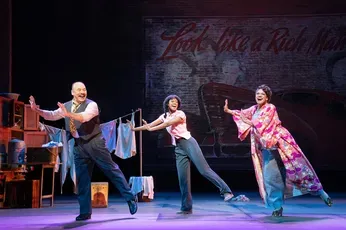
Greg Evans, Deadline
Read the review.
"There aren't enough dressing rooms on Broadway to contain all the expectations for the new 'Gypsy' . . . But along with the high hopes is the question that's been whispered since the production was announced months ago: Would McDonald, an opera-trained vocalist prized for her impossibly pure soprano, have the grit and belt for the rough-around-the-edges anti-heroine Rose, a character entrusted with a bundle of the finest, gutsiest anthems and ballads ever written by those formidable theater creators Arthur Laurents, Jule Styne and Stephen Sondheim? . . .
"The answer is a qualified, perhaps even reluctant, yes. I can't recall a better wrong-for-the-part performance in recent memory than McDonald's Rose. . .
"Supported by a fine roster of co-stars – notably Danny Burstein as Herbie, Joy Woods as Louise and Jordan Tyson as June – McDonald gives – no surprise here – an impeccable dramatic performance. . . Less convincing is McDonald's occasionally jarring vocal performance. There's no disputing that she's an amazing singer, one of the best on Broadway. Yet her frequent jumps from her chest voice – the rafter-raising belt most associated with Rose – and her head voice – the velvet soprano so prized by the six-time Tony winner's legions of devotees – takes us unsettlingly out of the moment. Momma Rose starts a verse; McDonald finishes it. . .
"So, that caveat out of the way, Wolfe's 'Gypsy,' which replaces the original Jerome Robbins choreography with new dances by the fabulous Camille A. Brown, easily takes its place among the long line of memorable Broadway 'Gypsys' and their stars, Ethel Merman, Angela Lansbury, Tyne Daly, Bernadette Peters and Patti LuPone (and, in a 1993 TV movie, Bette Midler), belters all."
Christopher Isherwood, the Wall Street Journal
Read the review. (Note: behind a firewall)
"Any production of 'Gypsy' rises or falls on its Rose, and Ms. McDonald's lifts this staging to majestic (sorry) heights. Days later I was reliving her 'Rose's Turn' in my mind with a mixture of elation, wonder and sorrow, the last arising from compassion for the devastating revelation of a woman's misbegotten life. Who, after all, does not have dreams that withered, ambitions left unfulfilled? Who has not at some point felt that we walk through life as ghosts, just wanting 'to be noticed,' as Rose wanly says in the musical's moving final scene?"
Johnny Oleksinski, the New York Post
Read the review.
"'Gypsy' is, by the estimation of many – including me – the greatest musical ever written.
"But you wouldn't know it from the slow and unsteady revival starring Audra McDonald that opened Thursday at the Majestic Theatre.
"The quintessentially American story about driving and moving from place to place while scraping by with a pipe dream of stardom does not satisfyingly drive or move. With stop-start direction from George C. Wolfe, the sixth Broadway production of Jule Styne, Stephen Sondheim and Arthur Laurents' musical runs out of gas early.
"She's less aggressive or mean than she is frantic, speaking lightning-fast in an almost mutter while buzzing about the stage, cajoling to get her daughters ahead. The actress goes for maybe half the biting laughs that are available to her. For a character described in the script as not nice, McDonald's interpretation is, well, awfully nice. A Rose without thorns."
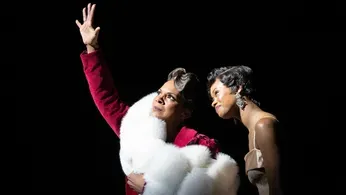
Adrian Horton, The Guardian
Read the review.
"The mother of all stage mothers, based on the domineering matriarch in the burlesque icon Gypsy Rose Lee's 1957 memoir, has earned her reputation as a destination for musical theater divas. The role is, as some have argued, Everest for a Broadway actor, pioneered by Ethel Merman in 1959 and since scaled by Angela Lansbury, Bette Midler, Tyne Daly, Bernadette Peters and most recently Patti LuPone in the 2008 revival. . . .
"But from the minute Audra McDonald's Rose appears in the latest revival, directed by George C Wolfe at the Majestic Theatre, she is a different flavor of unmissable. . . This is the first time on Broadway that Rose and her family have been played by Black actors, and McDonald imbues her with an extra layer of tragic defiance; her uphill climb is extra steep. . . .
"Her Rose trembles as much as she blusters. A classical soprano, McDonald possesses a voice more operatic and delicate than bombastic, an occasionally odd fit for a character of uncompromising, ruinous force. Her voice, gorgeous by any measure, carries the sound of inner tears – though you might wish, in a show-stopping number like 'Everything's Coming Up Roses,' that it plaster you against the back wall instead. . . .
"McDonald's rendition of the second show-stopper, 'Rose's Turn.' Alone on the stage apron, every bead of sweat and spit and tears alit, she channels a performer of abject desire, love and desperation. It's a true bravura performance, the type of mesmeric, shamanistic, nearly unbelievable wattage promised by the best of musical theater. No matter your defenses – the skepticism of another Broadway revival, our collective inurement to the pursuit of attention, up to 70 years of experience with this particular show – McDonald makes it sting, and makes this evergreen show business tragedy stick."
David Rooney, the Hollywood Reporter
Read the review.
"It's a cliché to call Rose, the archetypal pushy stage mother at the show's center, the King Lear of musical theater. But that's hard to dispute when you watch a consummate performer like Audra McDonald pour her heart and soul and every ounce of her gumption, her supple vocals and finely nuanced acting skills into the titanic role.
"The six-time Tony winner humanizes this driven, achingly unfulfilled woman without ever softening her abrasive edges, her relentlessly self-serving determination, her refusal to prioritize her daughters' well-being in her quest for the vicarious elation of stardom she herself feels she was denied. McDonald's Rose is a monstrous product of her misplaced ambition – manipulative, exploitative, maybe even emotionally abusive. But she's also a figure of shattering pathos. . . .
"The seemingly radical departure of casting Black and mixed-race actors as Rose, her daughters and other characters remains largely subtextual, though in McDonald's performance there are subtle suggestions that Rose sees racism as one of many factors that have held her back, denying her the acceptance she craves. Even subliminally, the casting adds a different texture to the character's grit and tenacity; she's a force of nature because that's what she had to be as a Black woman trying to get a foot in the door of the vaudeville circuit. . . .
"Some might say the star's voice is not an ideal fit for the role – too pure, too warm, too elegant, maybe – but McDonald is a resourceful actress, more than capable of molding the role to her glorious voice. What's arguably even more significant here is the complexity of her characterization. It's a vitally inhabited, deeply felt performance that finds the vulnerability beneath the tough steamroller. . .
"I could pick faults with the production. Camille A. Brown's choreography is more often busy than effective, notably in Gypsy Rose Lee's Ziegfeld-esque 'Garden of Eden' number, in which the chorus in sheer body stockings and strategic fig leaves look like they've stepped out of 'Showgirls.' And Louise's transformation from a shy kid just wanting her mother to notice her into a resplendent glamazon feels too abrupt. But rising star Woods looks so sensational in a Marcel wave and a shimmering red gown that she makes it work, a lifetime's dejection melting away as Louise seizes her liberation from the shadows.
"In any case, no minor flaw can diminish the impact of this masterful show in such a beautifully acted production – all of it orbiting around the blazing force that is McDonald."
Adam Feldman, Time Out
Read the review.
"How is she? Ever since May, when it was confirmed that Audra McDonald would star in the latest revival of 'Gypsy,' Broadway fans have speculated about how Audra would be as Mama Rose–or, more nervously, whether Audra could be Mama Rose, the implacable stage mother who sacrifices everything to make her two daughters into stars, including those two daughters themselves. The casting seemed inevitable: the pinnacle role for a woman in musical theater, essayed by the most accomplished musical-theater actress of her generation. It's Audra's turn. Yet to some, the casting also seemed unlikely: Rose has traditionally been played by big belters, from Ethel Merman in 1959 through Patti LuPone in 2008, not dramatic sopranos like McDonald. So let's get that question out of the way up front. How is Audra as Rose? She's a revelation.
"So, too, is the rest of George C. Wolfe's deeply intelligent and beautifully mounted production, which comes as a happy surprise. 'Gypsy' is a model musical in every regard, from Arthur Laurents's airtight book, inspired by the memoirs of striptease queen Gypsy Rose Lee, to Jule Styne's thrilling music, which grabs you at the overture and doesn't let go, to Stephen Sondheim's dazzlingly witty and insightful lyrics. But this is the show's fifth Broadway revival, and its third in the 21st century alone. One might reasonably wonder what is left to reveal in a show as well-known as this one. But like the monster some people believe her to be, Mama Rose refuses to die. Here she is again, boys: Rose is risen anew.
"In many ways, this Gypsy is grandly old-fashioned: It has a cast of 30 and an orchestra of 25; the set (by Santo Loquasto), costumes (by Toni-Leslie James), hair (by Mia Neal) and lighting (by Jules Fisher and Peggy Eisenhauer) are worthy of the Majestic Theatre's name. This is a tree with all the trimmings–including restored bits of text that Laurents trimmed from previous revivals; there's even new musical material, such as a brief introductory duet for 'Small World.' "
Robert Nesti can be reached at [email protected].

